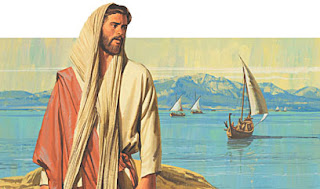Greek philosophy is complicated to our modern minds. If you have ever sat through a philosophy class you might remember how confusing Heraclitus, Anaxagoras, Plato and Aristotle can be. But it was second nature to the people of Christ's time. The Gospel of John is sometimes accused of being too Greek for a Galilean Jew to have written. Skeptics sometimes fail to realize that the Jews were very knowledgeable of Hellenistic thought. And by the time John the Beloved wrote his testimony he had lived in the Greek world for more than half his life. The "I Am" statements in his gospel show that it was written by a Jewish hand. But John was writing to introduce Jesus Christ to a Greek world. In his testimony, John seized upon the idea of the Logos to introduce Christ. It was a brilliant missionary move, similar to Paul's use of the unknown God on Mar's Hill. He used concepts familiar to them to show who Jesus was.
 Greeks wondered about the nature of truth and life, reality and perception, beginnings and purpose. So John opens with a very Greek concept - "In the beginning was the Word, and the Word was with God, and the Word was God. The same was in the beginning with God. All things were made by him; and without him was not any thing made that was made. In him was life; and the life was the light of men" (John 1:1-4). There verses would have seemed familiar to the Greek mind. Let's focus in on "the Word." The Greek word here is "Logos." The Logos in Greek philosophy is the single power dominating the universe, it controls all things. The Logos is thought and reason and not physical at all. We get our word "logic" from it. The Logos always existed - it could not have been created. Nothing could have existed before the Logos, and nothing exists without it.
Greeks wondered about the nature of truth and life, reality and perception, beginnings and purpose. So John opens with a very Greek concept - "In the beginning was the Word, and the Word was with God, and the Word was God. The same was in the beginning with God. All things were made by him; and without him was not any thing made that was made. In him was life; and the life was the light of men" (John 1:1-4). There verses would have seemed familiar to the Greek mind. Let's focus in on "the Word." The Greek word here is "Logos." The Logos in Greek philosophy is the single power dominating the universe, it controls all things. The Logos is thought and reason and not physical at all. We get our word "logic" from it. The Logos always existed - it could not have been created. Nothing could have existed before the Logos, and nothing exists without it.Every day we need to take in the word of God. We can't declare the word until we have studied it (D&C 11:21). The scriptures, the study of Christ, and gospel learning are our logos. And when that study takes on meaning by the power of the spirit it becomes rhema to us. Our task, like the weightlifter, is to take in the logos, and then let the spirit convert it into rhema. The spirit uses the logos we have taken in, and utilizes it to give us revelation, to form testimony, to answer prayer. It is this rhema which forms the only offensive weapon in the Whole Armor of God for "the sword of the Spirit ...is the word of God" (Ephesians 6:17).
The Holy Ghost is a revelator who draws upon the logos which we have already put into our minds. If we are honest we realize that most spiritual insights are not the discovery of brand new things, but seeing known things in brand new ways. The Spirit takes what we have and arranges it to reveal a fuller meaning and a deeper insight. Prophets often have visions to introduce new logos to their minds. Joseph Smith never considered that the church was not in fullness upon the earth. There was no logos for it. And He had a vision. But most of Joseph's revelations were given through the Spirit as he studied the word of God, and pondered it. Every priesthood holder who gives a blessing, every parent who prays for a child, every Bishop who directs a ward, all of us as we seek the Lord in revelation need to ingest the logos so that we might partake of the rhema. Then we will "have tasted the good word (rhema) of God" (Heb 6:5). Peter knew this when he responded to the Lord, "to whom shall we go? Thou hast the words of eternal life" (John 6:68).







